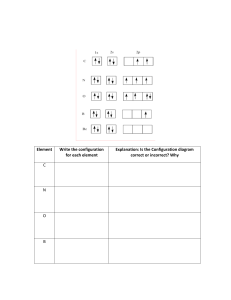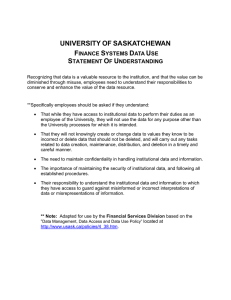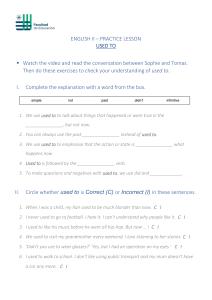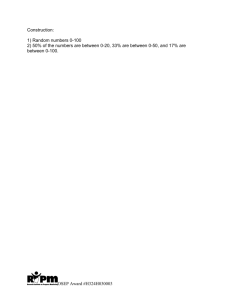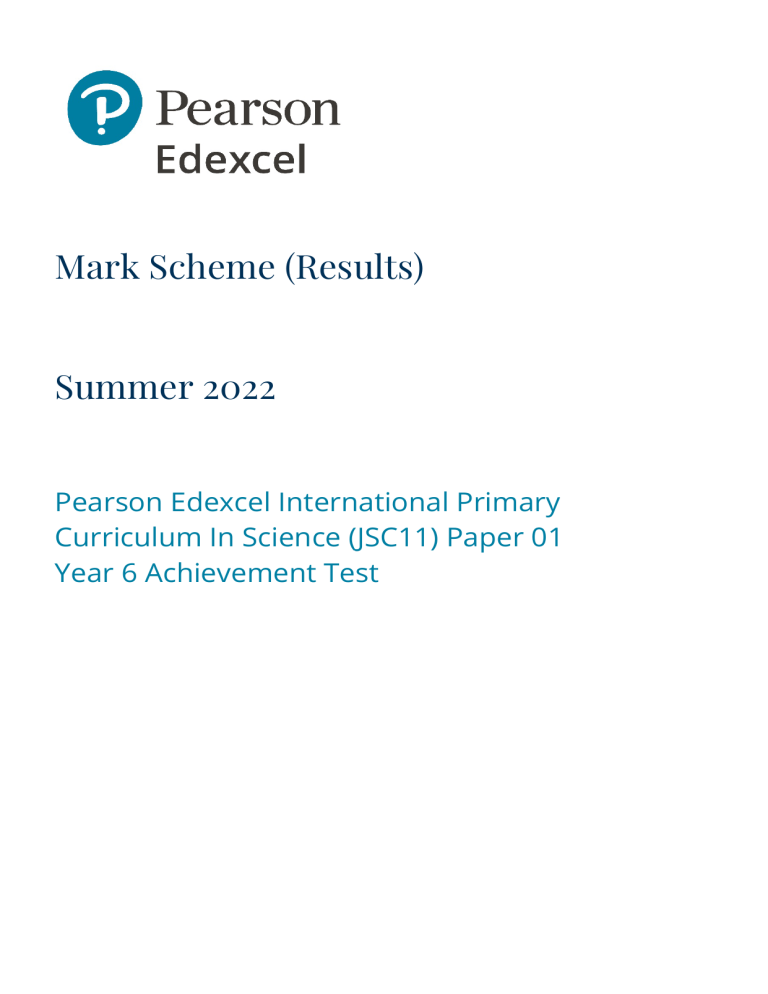
Mark Scheme (Results) Summer 2022 Pearson Edexcel International Primary Curriculum In Science (JSC11) Paper 01 Year 6 Achievement Test Edexcel and BTEC Qualifications Edexcel and BTEC qualifications are awarded by Pearson, the UK’s largest awarding body. We provide a wide range of qualifications including academic, vocational, occupational and specific programmes for employers. For further information visit our qualifications websites at www.edexcel.com or www.btec.co.uk. Alternatively, you can get in touch with us using the details on our contact us page at www.edexcel.com/contactus. Pearson: helping people progress, everywhere Pearson aspires to be the world’s leading learning company. Our aim is to help everyone progress in their lives through education. We believe in every kind of learning, for all kinds of people, wherever they are in the world. We’ve been involved in education for over 150 years, and by working across 70 countries, in 100 languages, we have built an international reputation for our commitment to high standards and raising achievement through innovation in education. Find out more about how we can help you and your students at: www.pearson.com/uk Summer 2022 Question Paper Log Number P67631A Publications Code JSC11_01_2206_MS All the material in this publication is copyright © Pearson Education Ltd 2022 General Marking Guidance • All candidates must receive the same treatment. Examiners must mark the first candidate in exactly the same way as they mark the last. • Mark schemes should be applied positively. Candidates must be rewarded for what they have shown they can do rather than penalised for omissions. • Examiners should mark according to the mark scheme not according to their perception of where the grade boundaries may lie. • There is no ceiling on achievement. All marks on the mark scheme should be used appropriately. • All the marks on the mark scheme are designed to be awarded. Examiners should always award full marks if deserved, i.e. if the answer matches the mark scheme. Examiners should also be prepared to award zero marks if the candidate’s response is not worthy of credit according to the mark scheme. • Where some judgement is required, mark schemes will provide the principles by which marks will be awarded and exemplification may be limited. • When examiners are in doubt regarding the application of the mark scheme to a candidate’s response, the team leader must be consulted. • Crossed out work should be marked UNLESS the candidate has replaced it with an alternative response. Mark scheme Question number 1 Answer Mark The only correct answer is C the grass is a producer (1) A is not correct because the fox is a secondary consumer B is not correct because the grass is a producer D is not correct because the rabbit is a primary consumer Question number 2 Answer Mark The only correct answer is D newtons (1) A is not correct centimetres is a unit for length B is not correct degrees Celsius is the unit for temperature C is not correct kilograms is the unit for mass Question number 3 Answer Mark The only correct answer is A fertiliser (1) B is incorrect because heat does not contain useful minerals C is incorrect because light does not contain useful minerals D is incorrect because sand does not contain useful minerals Question number 4 Answer Mark The only correct answer is D melting (1) A is incorrect condensing happens when a gas changes to a liquid. B is incorrect evaporating happens when a liquid changes to a gas C is incorrect freezing happens when a liquid changes to a solid Question number Answer 5 The only correct answer is C as it takes 365 days for the Earth to complete an orbit of the Sun and 24 hours to spin once on its axis. Mark (1) A is incorrect because it takes 365 days for the Earth to complete an orbit of the Sun and 24 hours to spin once on its axis. B is incorrect because it takes 365 days for the Earth to complete an orbit of the Sun and 24 hours to spin once on its axis. D is incorrect because it takes 365 days for the Earth to complete an orbit of the Sun and 24 hours to spin once on its axis. Question number 6 Answer Mark The only correct answer is D – P is the stigma, Q is the anther and R is the ovary. (1) A is incorrect because P is the stigma, Q is the anther and R is the ovary. B is incorrect because P is the stigma, Q is the anther and R is the ovary. C is incorrect because P is the stigma, Q is the anther and R is the ovary. Question number 7 Answer Mark The only correct answer is C. There are 2 bulbs, 2 cells, 1 motor and 1 switch (1) A is not the correct answer because there are 2 bulbs, 2 cells, 1 motor and 1 switch B is not the correct answer because there are 2 bulbs, 2 cells, 1 motor and 1 switch D is not the correct answer because there are 2 bulbs, 2 cells, 1 motor and 1 switch Question number 8 Answer Mark The only correct answer is B. W is evaporation, X is sea, Y is condensation and Z is precipitation (1) A is not correct because W is showing evaporation, X is the sea, Y is showing condensation of water into clouds and Z is showing precipitation causing rain. C is not correct because W is showing evaporation, X is the sea, Y is showing condensation of water into clouds and Z is showing precipitation causing rain. D is not correct because W is showing evaporation, X is the sea, Y is showing condensation of water into clouds and Z is showing precipitation causing rain. Question number 9 Answer Mark The only correct answer is D – storing food in an unsealed container. (1) A is not the correct answer because cleaning surfaces is a good food hygiene practice B is not the correct answer because handwashing is a good food hygiene practice C is not the correct answer because refrigeration storage is a good food hygiene practice Question number 10 Answer Mark The only correct answer is D. Frogs are vertebrates and have smooth, slimy skin (1) A is not correct because frogs are vertebrates and have smooth, slimy skin B is not correct because frogs are vertebrates and have smooth, slimy skin C is not correct because frogs are vertebrates and have smooth, slimy skin Question number 11 Answer Mark (2) Award 2 marks for four correct answers Award 1 mark for two or three correct answers Question number 12 (a) Answer Award one mark for 10 (minutes) Additional guidance Mark (1) Question number 12 (b) Answer Additional guidance Mark (1) Award one mark for The heart Question number 12 (c) Answer Additional guidance Award one mark for Mark (1) Do not credit answers with more than one line from any of the box on the left Question number 13 Answer Mark The only correct answer is C. The roots anchor the plant and takes in water and nutrients. (1) A is not correct because the flower is where reproduction takes place B is not correct because the leaf is where food is manufactured D is not correct because the stem supports the plant and transports water and nutrients Question number 14 Answer Mark The only correct answer is A filtering (1) B is not correct since the diagram is showing the technique for filtering and not heating C is not correct since the diagram is showing the technique for filtering and not sieving D is not correct since the diagram is showing the technique for filtering and not stirring Question number 15 Answer Mark The only correct answer is A. All predators eat prey (1) B is not correct because all predators eat prey. C is not correct because all predators eat prey. Predators are not producers D is not correct because all predators eat prey. They eat meat and may also eat plants Question number 16 Answer Mark The only correct answer is C – force C is acting towards the centre of the moon and represents the weight (1) A is incorrect since the force representing weight acts towards the centre of the moon and not vertically away from the moon B is incorrect since the force representing weight acts towards centre of the moon D is incorrect since the force representing weight acts towards the centre of the moon Question number 17 Answer Mark The only correct answer is D. The bird has a straight beak and no crest of feathers on head. (1) A is not correct the bird in the picture has a straight beak and no crest of feathers on its head. B is not correct the bird in the picture has a straight beak and no crest of feathers on its head. C is not correct the bird in the picture has a straight beak and no crest of feathers on its head. Question number 18 (a) Answer Mark The only correct answer is C the forces are a different size and act in the opposite direction (1) A is incorrect because the two forces acting on the cyclist are unbalanced and are acting in opposite directions. B is incorrect because the two forces acting on the cyclist are unbalanced and are acting in opposite directions. D is incorrect because the two forces acting on the cyclist are unbalanced and are acting in opposite directions. Question number 18 (b) Answer Additional guidance Award one mark for each of the following Ignore go faster the helmet reduces air resistance/friction (1) Allow helmet has low air resistance the helmet is streamlined (1) Accept aerodynamic shape Mark (2) Question number 18 (c) Answer Additional guidance Award one mark for the following Ignore Increase grip or increase friction Use tyres with a tread/rougher tyre surface (1) Mark (1) Ignore add spikes, bumps/ studs or make tyres hard Allow more grooves / add a pattern to the tyres Question number 19 Answer Additional guidance Mark (2) The sugar in this process is an example of a solute. (1) The sweet liquid produced in this process is an example of a solution. (1) Question number 20 Answer Award 1 mark for each line that is correct up to 3 marks Do not credit answers with more than one line from any of the boxes on the left Additional guidance Mark (3) Question number 21 Answer Additional guidance Award one mark for any one of the following Allow any stated values that give a correct comparison Circuit B has the lowest voltage / circuit C has the highest voltage (1) Mark (1) Ignore brightness Circuit A has a higher voltage than circuit B (1) Circuit A has a lower voltage than circuit C (1) Ignore the higher the voltage the brighter the lamp Ignore length / thickness of wire Circuit C has a higher voltage (than circuit B OR Circuit A) (1) each circuit has a different voltage (1) Question number 22 Accept C has more voltage but not C has high voltage Answer Mark The only correct answer is A - bacteria (1) B is not correct because insects are large enough to be observed with the naked eye and do not require a microscope C is not correct because mammals are large enough to be observed with the naked eye and do not require a microscope D is not correct because reptiles are large enough to be observed with the naked eye and do not require a microscope Question number 23 Answer Mark The only correct answer is A – how hot something is (1) B is incorrect because temperature is a measure of how hot something is and not length C is incorrect because temperature is a measure of how hot something is and not how shiny something is D is incorrect because temperature is a measure of how hot something is and not how solid something is. Question number 24 Answer Mark The only correct answer is D increase the amount of oxygen in the lungs (1) A is incorrect because when lungs inflate the amount of air in the lungs increases therefore increasing the amount of oxygen. B is incorrect because when lungs inflate the amount of air in the lungs increases therefore increasing the amount of oxygen. C is incorrect because when lungs inflate the amount of air in the lungs increases therefore increasing the amount of oxygen. Question number 25 Answer Mark The only correct answer is C the diagram showing light rays (1) travel from the light source to the book and reflecting off the book into the student’s eyes A is not correct because light rays travel from the light source to the book and reflecting off the book into the student’s eyes B is not correct because light rays travel from the light source to the book and reflecting off the book into the student’s eyes D is not correct because light rays travel from the light source to the book and reflecting off the book into the student’s eyes Question number 26 Answer Additional guidance (Dish) C (1) Linked mark points seeds require warmth and moisture to germinate well (1) Allow reference to moisture evaporating from dish B Mark (2) Question number 27(a) Answer Additional guidance Award 1 mark for each of the following up to a maximum of 2 marks. Ignore planets are in the wrong order / sun not in the right place (In the Ptolemy model) the Earth is at the centre of the planetary system / the Sun is not at the centre OR Ignore references to Uranus and Neptune not being included in the Ptolemy model the sun should be at the centre of the solar system / in the present model the Sun is at the centre (1) (In the Ptolemy model) the Sun or other planets orbits the Earth / the Earth does not orbit the sun Allow Venus is closer to the sun than Mercury OR in the present model the Earth orbits the Sun / the planets do not orbit the Earth (1) Accept (In the Ptolemy model) the Moon looks like a planet / in present model the Moon is a satellite of Earth Accept (In the Ptolemy model) the orbits are circular / the orbits are not circular in the present model Mark (2) Question number 27(b) Answer Additional guidance (Uranus and Neptune) had not been discovered / seen / observed (1) Ignore too far away Question number 28a Answer Additional guidance Question number 28b Answer Question number 29 Additional guidance Mark (1) Both required for 1 mark Answer Additional guidance (Buzzer) is louder / more sound(1) Must be comparative e.g. Accept loudest, but not loud (Motor) moves faster /more movement (1) Mark Both required for 1 mark Award one mark for the following (substances) A and C (given in any order) (1) (1) Award one mark for the following Water and (substance) B (given in any order) Mark Fast is insufficient, but accept fastest Mark (2) Question number 30 Answer Additional guidance (2) small/thin leaves (1) OWTTE to reduce water loss / transpiration (1) OR thorns (1) to deter herbivores from eating the leaves (1) Mark Allow spikes Do not accept predators OR long roots (1) to find water (1) Section B Question number 31(a) Answer Additional guidance (2) Award 1 mark for each of the following up to a maximum of 2 marks. same type of paper (1) same wing width for each test (1) Mark Allow same height of the spinner same drop height / drop from 2 m high (1) same distance from fan each test / drop 1 m away from the fan (1) same size/type of paper clip (1) same fan speed (1) Question number 31(b) Answer Additional guidance (1) Award 1 mark for length of wings (1) Mark Ignore width / size Question number 31(c) Answer Additional guidance Mark (1) Award 1 mark for repeat readings / tests three times (1) Question number 31(d) Answer Additional guidance Mark (2) the 45cm result/test 3 for 4 cm length wings looks odd (1) because the value of (45cm) is very different from the other two results for test 1 and 2 (for the same length of wing) (1) Question number 32 (a) Answer Additional guidance Question number 32 (b) Answer Question number 32 (c) Answer Additional guidance bar at 30oC correctly shown (1) Ignore width of the bar Mark (1) (Question) 4 Additional guidance Mark (1) 15 (g) Mark (2) bar at 45oC correctly shown (1) Question number 32 (d) Answer decreases Additional guidance Mark (1) Question number 33(a) Answer Additional guidance ruler Allow measuring tape Question number 33(b) Answer Additional guidance Award 1 mark for any one of the following Accept same car releases toy car from the same point on the ramp each test (1) Ignore repeat step 4, or 2 and 4 Mark (1) Mark (1) always measures from the bottom of the ramp to the back of the car (1) Question number 33 (c) (i) Question number 33 (c) (ii) Answer Additional guidance Mark (1) (stopping) distance in cm Answer Additional guidance 84 cm Accept any value between 82 -86 cm Accept value given from candidates drawn line of best fit +/- 1 small square Mark (1) Pearson Education Limited. Registered company number 872828 with its registered office at 80 Strand, London, WC2R 0RL, United Kingdom
